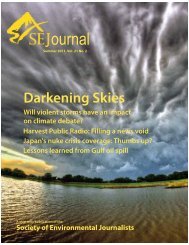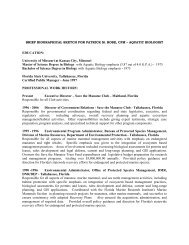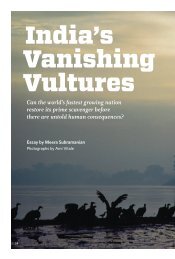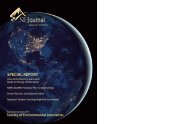PDF Download - Society of Environmental Journalists
PDF Download - Society of Environmental Journalists
PDF Download - Society of Environmental Journalists
Create successful ePaper yourself
Turn your PDF publications into a flip-book with our unique Google optimized e-Paper software.
Fund for <strong>Environmental</strong> Journalism<br />
continued from previous page<br />
Jim Carrier, Madison, WI, $400 for travel for a multimedia<br />
project on hunters and environmental health in Wisconsin,<br />
Colorado and Wyoming.<br />
Some new ventures funded in a second round <strong>of</strong> grants<br />
include Florida Center for Investigative Reporting, which is<br />
producing a multimedia project about an environmental issue<br />
in Florida.<br />
“Investigative journalism is needed more than ever and SEJ<br />
understands the value <strong>of</strong> supporting watchdog journalism at a time<br />
when newsroom resources are dwindling and new models <strong>of</strong><br />
journalism are emerging on the Internet, providing more<br />
opportunities to publish stories that matter,” said McNelly Torres,<br />
associate director <strong>of</strong> the Florida Center for Investigative<br />
Reporting. “We are thrilled and thankful that we were selected as<br />
recipient <strong>of</strong> this grant.”<br />
Roberto “Bear” Guerra, who won $1,900 from FEJ in 2010 to<br />
help with costs <strong>of</strong> reporting in Peru’s Amazon Basin on the<br />
impacts <strong>of</strong> the soon-to-be-completed Transoceanic Highway, said<br />
that “at a time when fewer and fewer outlets can afford to pay the<br />
costs associated with reporting — or in my case, photographing —<br />
environmental stories, we run the risk <strong>of</strong> not knowing about many<br />
situations until it’s too late ...<br />
“Today, journalists and photographers simply can no longer<br />
do this work without the help <strong>of</strong> funding from organizations like<br />
the <strong>Society</strong> <strong>of</strong> <strong>Environmental</strong> <strong>Journalists</strong>,” Guerra said. “I hope to<br />
see the Fund grow in the coming years, and continue to provide<br />
opportunities for journalists to tell the stories that might otherwise<br />
not get told.”<br />
Ah, yes, Jude Isabella.<br />
Her $900 FEJ grant allowed her to travel to a remote area <strong>of</strong><br />
British Columbia to report and photograph with a team <strong>of</strong><br />
biologists. The trip will be used for a magazine piece, as well as a<br />
book on salmons and humans and, maybe, paintings.<br />
“Because my book is about human and salmon life histories,<br />
going to this area with biologists was an amazing opportunity,”<br />
Isabella said. “It’s also the place where archaeologists have found<br />
some <strong>of</strong> the oldest evidence <strong>of</strong> Pacific salmon exploitation by<br />
humans on the West Coast.<br />
“The scientists took me through the bush, walking along<br />
salmon streams that fed people for thousands <strong>of</strong> years.”<br />
Applications for an FEJ grant can be found at www.sej.org.<br />
Please also consider making a donation to the fund, so even more<br />
quality journalists can keep tracking their dream stories.<br />
Michael Mansur, SEJournal editor, reports for The Kansas<br />
City Star. He can be reached at mansur.michael@gmail.com.<br />
10 SEJournal Spring 2011<br />
SEJ President’s Report<br />
continued from page 4<br />
Names and the dollar ranges <strong>of</strong> all gifts must be disclosed on<br />
sej.org at least quarterly and in the SEJournal at least annually. All<br />
donations <strong>of</strong> $5,000 or more must still be reported in their exact<br />
amounts on SEJ’s IRS Form 990, which will continue to be posted<br />
on sej.org.<br />
SEJ does not accept anonymous donations.<br />
“I think it’s a really good step,’’ SEJ member Paul Rogers <strong>of</strong><br />
the San Jose Mercury News and KQED’s Quest told me.<br />
Rogers, who served on the board <strong>of</strong> directors <strong>of</strong> the Institutes<br />
for Journalism and Natural Resources from 2002-2010,<br />
recommended SEJ make “every effort to find a diverse group <strong>of</strong><br />
donors’’ from the environmental community and from corporations,<br />
but SEJ must “clearly disclose the donors.”<br />
“When reporters write stories, they interview all sides,’’<br />
Rogers said. “That’s considered a strength in reporting. It’s only<br />
natural that SEJ pursues diverse funding. The most important<br />
thing to me is that the donations come with no strings attached.’’<br />
Rogers pointed out that neither member dues nor conference<br />
fees could fund the “important’’ work SEJ does. With 1,500<br />
members and a $1-million-a-year operating budget, members<br />
would have to pay about $666 in annual dues just to maintain the<br />
organization’s current programming and operations, Rogers said.<br />
In 2010, SEJ’s nearly $900,000 operating budget was underwritten<br />
45 percent by foundation grants and media company<br />
contributions in response to SEJ proposals, 30 percent by earned<br />
income (dues, subscriptions, advertising sales, contest entry fees,<br />
conference fees and exhibitor fees), 22.5 percent by the<br />
University <strong>of</strong> Montana sponsorship <strong>of</strong> the annual conference, and<br />
2.5 percent by gifts from individuals.<br />
Bud Ward, a founding SEJ board member, also supported the<br />
new policy. “It’s vital for environmental journalism that we stay<br />
vibrant and independent,’’ Ward told me. He suggested SEJ<br />
consider funding policies like the National Public Radio model.<br />
Like Rogers, Ward stressed the need for complete<br />
transparency regarding donor gifts.<br />
“SEJ is the pre-eminent network <strong>of</strong> educated, well-connected,<br />
pr<strong>of</strong>essional environmental journalists,” Executive Director Beth<br />
Parke said.<br />
“People who follow environmental issues appreciate what<br />
SEJ does,’’ Parke said. “I’m glad the organization can now<br />
welcome and accept no-strings support from anyone who values<br />
what we do to strengthen environmental journalism.’’<br />
More information on SEJ’s revised financial policy is at<br />
http://www.sej.org/funding-policy-change.<br />
Carolyn Whetzel, SEJ board president, covers environmental<br />
issues in California for BNA, Inc.<br />
“Make a donation to the fund so even more quality journalists<br />
can keep tracking their dream stories.”<br />
www.sej.org/get-involved/donate












